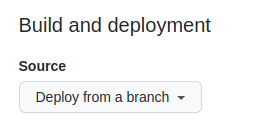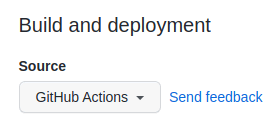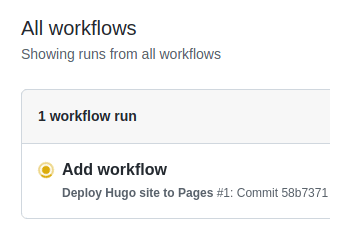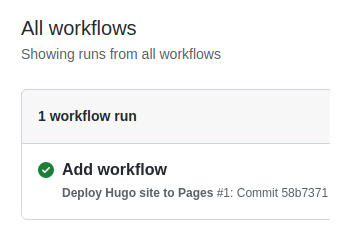a7e1e9be8 Clarify front matter date fields 69df4fc22 Clarify how to determine if .Inner is populated 9046bf424 Document strings.ContainsNonSpace 8dbe5df90 Fix indentation and broken image 48ad4124e Typo: functions/after.md d4c01b57b Link to detailed descriptions of canonfiyURLs and relativeURLs 4d9597302 Explain behaviour when appending to a slice containing other slices 69e24e44e Standardize right arrow usage 01b378726 Remove references to Google's Universal Analytics and the async template d415bae24 Use shared file to describe regex syntax e75dee6b8 snap: How to enable or revoke access to SSH keys feed2d1c0 Remove hasPrefix and hasSuffix in favor of namespaced versions 3c6d2cfe5 security: Use default execution settings 461b5fcaf netlify: Hugo 0.116.1 95fac27a5 configuration: correct cacheDir description cd9f1f929 configuration: Fix broken link 605394de4 netlify: Upgrade to Hugo 0.116.0 baf2a0f7b Merge branch 'tempv0.116.0' ee51a9323 Update requirements for building from source 40189956d Editor tools: Remove duplicate sentence fb0ff2621 docs: Regenerate CLI docs e8a5665c4 Update where.md 7bc5cf15d Update hosting instructions 018a04314 docs: Update where d33ae91cf docs: Update where function operators 9a108a664 docs: Rework the cacheDir documentation git-subtree-dir: docs git-subtree-split: a7e1e9be851b95e636ab5360e5151156b4f89044
5.6 KiB
| title | description | categories | keywords | menu | toc | aliases | ||||||||||
|---|---|---|---|---|---|---|---|---|---|---|---|---|---|---|---|---|
| Host on GitHub Pages | Deploy Hugo as a GitHub Pages project or personal/organizational site and automate the whole process with Github Actions |
|
|
|
true |
|
GitHub provides free and fast static hosting over SSL for personal, organization, or project pages directly from a GitHub repository via its GitHub Pages service and automating development workflows and build with GitHub Actions.
Prerequisites
- Create a GitHub account
- Install Git
- Create a Hugo site and test it locally with
hugo server.
Types of sites
There are three types of GitHub Pages sites: project, user, and organization. Project sites are connected to a specific project hosted on GitHub. User and organization sites are connected to a specific account on GitHub.com.
{{% note %}} See the GitHub Pages documentation to understand the requirements for repository ownership and naming.
{{% /note %}}
Procedure
- Step 1
- Create a GitHub repository.
- Step 2
- Push your local repository to GitHub.
- Step 3
- Visit your GitHub repository. From the main menu choose Settings > Pages. In then center of your screen you will see this:
- Step 4
- Change the Source to
GitHub Actions. The change is immediate; you do not have to press a Save button.
- Step 5
- Create an empty file in your local repository.
.github/workflows/hugo.yaml
- Step 6
- Copy and paste the YAML below into the file you created. Change the branch name and Hugo version as needed.
{{< code file=".github/workflows/hugo.yaml" >}}
Sample workflow for building and deploying a Hugo site to GitHub Pages
name: Deploy Hugo site to Pages
on:
Runs on pushes targeting the default branch
push: branches: - main
Allows you to run this workflow manually from the Actions tab
workflow_dispatch:
Sets permissions of the GITHUB_TOKEN to allow deployment to GitHub Pages
permissions: contents: read pages: write id-token: write
Allow only one concurrent deployment, skipping runs queued between the run in-progress and latest queued.
However, do NOT cancel in-progress runs as we want to allow these production deployments to complete.
concurrency: group: "pages" cancel-in-progress: false
Default to bash
defaults: run: shell: bash
jobs:
Build job
build:
runs-on: ubuntu-latest
env:
HUGO_VERSION: 0.115.4
steps:
- name: Install Hugo CLI
run: |
wget -O ${{ runner.temp }}/hugo.deb https://github.com/gohugoio/hugo/releases/download/v${HUGO_VERSION}/hugo_extended_${HUGO_VERSION}_linux-amd64.deb
&& sudo dpkg -i ${{ runner.temp }}/hugo.deb
- name: Install Dart Sass
run: sudo snap install dart-sass
- name: Checkout
uses: actions/checkout@v3
with:
submodules: recursive
fetch-depth: 0
- name: Setup Pages
id: pages
uses: actions/configure-pages@v3
- name: Install Node.js dependencies
run: " -f package-lock.json && npm ci || true"
- name: Build with Hugo
env:
# For maximum backward compatibility with Hugo modules
HUGO_ENVIRONMENT: production
HUGO_ENV: production
run: |
hugo
--gc
--minify
--baseURL "${{ steps.pages.outputs.base_url }}/"
- name: Upload artifact
uses: actions/upload-pages-artifact@v1
with:
path: ./public
Deployment job
deploy: environment: name: github-pages url: ${{ steps.deployment.outputs.page_url }} runs-on: ubuntu-latest needs: build steps: - name: Deploy to GitHub Pages id: deployment uses: actions/deploy-pages@v2 {{< /code >}}
- Step 7
- Commit the change to your local repository with a commit message of something like "Add workflow", and push to GitHub.
- Step 8
- From GitHub's main menu, choose Actions. You will see something like this:
- Step 9
- When GitHub has finished building and deploying your site, the color of the status indicator will change to green.
- Step 10
- Click on the commit message as shown above. You will see this:
Under the deploy step, you will see a link to your live site.
In the future, whenever you push a change from your local repository, GitHub will rebuild your site and deploy the changes.




